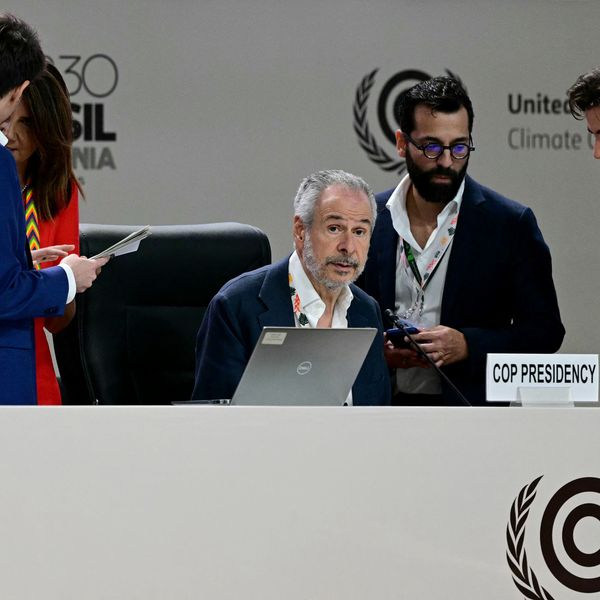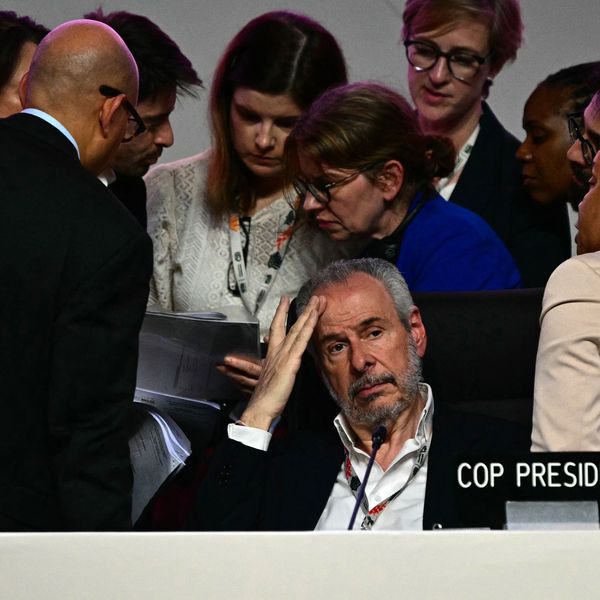With 'Time Running Out,' G20 Fails on Fossil Fuel Subsidies
'Handing out money to the fossil fuel industry is simply not compatible with the Paris agreement'
Despite calls from environmental leaders, major insurance companies, global investors, and climate groups, the G20 has failed to put a deadline on phasing out fossil fuel subsidies, yet again.
German press agency DPA reported Monday that a late draft of the G20 Leaders' Communique "did not mention plans to fulfill a promise the G20 made seven years ago to put an end to controversial fossil fuel subsidies."
That recalcitrance runs counter to wide swaths of public opinion.
An open letter (pdf) in June from more than 200 civil society organizations called for a 2020 cut-off date, warning that the estimated $444 billion in G20 subsidies to the fossil fuels industry "are locking in long-lived, high-emitting infrastructure and unlocking new fossil fuel reserves." Bloomberg, in an editorial last week, called fossil fuel subsidies "an egregious policy failure that has been allowed to persist for far too long."
On the heels of the U.S. and China formally doing so on Saturday, the entire G20 did pledge to join the Paris climate agreement, with the communique saying leaders "expect a rapid implementation of the agreement in all its dimensions."
But that deal--already limited in its ability to curtail global warming--is just lip service without action on subsides, said Oil Change International senior campaigner Alex Doukas on Monday.
"On China's watch, G20 leaders have again failed to set a deadline to end fossil fuel subsidies, despite first agreeing to do so in 2009," Doukas said. "Time is running out. Every dollar wasted on fossil fuel subsidies pushes us closer to climate disaster and makes the transition to clean energy more difficult. As more governments take the important step of ratifying the Paris Agreement on climate change, they must stop giving handouts to big polluters, which undermine the spirit and the letter of the Paris deal."
Li Shuo, Greenpeace East Asia's senior climate policy adviser, echoed that charge, declaring: "Handing out money to the fossil fuel industry is simply not compatible with the Paris Agreement."
What's more, Doukas told Climate Home, the communique included new language promising to "promote methods of extraction, transportation and processing of natural gas that minimise environmental impacts"--which would appear to directly contradict the goal of ending subsidies.
Both Greenpeace and Oil Change International called on Germany to push for strong climate action as new G20 host.
"If German Chancellor Angela Merkel wants to maintain her reputation as a climate champion through next year's G20 presidency, she must lead the way in securing a strong commitment from world leaders to end all fossil fuel subsidies by 2020," Doukas said. "The whole world is telling G20 leaders it's time to stop funding fossils."
An Urgent Message From Our Co-Founder
Dear Common Dreams reader, The U.S. is on a fast track to authoritarianism like nothing I've ever seen. Meanwhile, corporate news outlets are utterly capitulating to Trump, twisting their coverage to avoid drawing his ire while lining up to stuff cash in his pockets. That's why I believe that Common Dreams is doing the best and most consequential reporting that we've ever done. Our small but mighty team is a progressive reporting powerhouse, covering the news every day that the corporate media never will. Our mission has always been simple: To inform. To inspire. And to ignite change for the common good. Now here's the key piece that I want all our readers to understand: None of this would be possible without your financial support. That's not just some fundraising cliche. It's the absolute and literal truth. We don't accept corporate advertising and never will. We don't have a paywall because we don't think people should be blocked from critical news based on their ability to pay. Everything we do is funded by the donations of readers like you. Will you donate now to help power the nonprofit, independent reporting of Common Dreams? Thank you for being a vital member of our community. Together, we can keep independent journalism alive when it’s needed most. - Craig Brown, Co-founder |
Despite calls from environmental leaders, major insurance companies, global investors, and climate groups, the G20 has failed to put a deadline on phasing out fossil fuel subsidies, yet again.
German press agency DPA reported Monday that a late draft of the G20 Leaders' Communique "did not mention plans to fulfill a promise the G20 made seven years ago to put an end to controversial fossil fuel subsidies."
That recalcitrance runs counter to wide swaths of public opinion.
An open letter (pdf) in June from more than 200 civil society organizations called for a 2020 cut-off date, warning that the estimated $444 billion in G20 subsidies to the fossil fuels industry "are locking in long-lived, high-emitting infrastructure and unlocking new fossil fuel reserves." Bloomberg, in an editorial last week, called fossil fuel subsidies "an egregious policy failure that has been allowed to persist for far too long."
On the heels of the U.S. and China formally doing so on Saturday, the entire G20 did pledge to join the Paris climate agreement, with the communique saying leaders "expect a rapid implementation of the agreement in all its dimensions."
But that deal--already limited in its ability to curtail global warming--is just lip service without action on subsides, said Oil Change International senior campaigner Alex Doukas on Monday.
"On China's watch, G20 leaders have again failed to set a deadline to end fossil fuel subsidies, despite first agreeing to do so in 2009," Doukas said. "Time is running out. Every dollar wasted on fossil fuel subsidies pushes us closer to climate disaster and makes the transition to clean energy more difficult. As more governments take the important step of ratifying the Paris Agreement on climate change, they must stop giving handouts to big polluters, which undermine the spirit and the letter of the Paris deal."
Li Shuo, Greenpeace East Asia's senior climate policy adviser, echoed that charge, declaring: "Handing out money to the fossil fuel industry is simply not compatible with the Paris Agreement."
What's more, Doukas told Climate Home, the communique included new language promising to "promote methods of extraction, transportation and processing of natural gas that minimise environmental impacts"--which would appear to directly contradict the goal of ending subsidies.
Both Greenpeace and Oil Change International called on Germany to push for strong climate action as new G20 host.
"If German Chancellor Angela Merkel wants to maintain her reputation as a climate champion through next year's G20 presidency, she must lead the way in securing a strong commitment from world leaders to end all fossil fuel subsidies by 2020," Doukas said. "The whole world is telling G20 leaders it's time to stop funding fossils."
Despite calls from environmental leaders, major insurance companies, global investors, and climate groups, the G20 has failed to put a deadline on phasing out fossil fuel subsidies, yet again.
German press agency DPA reported Monday that a late draft of the G20 Leaders' Communique "did not mention plans to fulfill a promise the G20 made seven years ago to put an end to controversial fossil fuel subsidies."
That recalcitrance runs counter to wide swaths of public opinion.
An open letter (pdf) in June from more than 200 civil society organizations called for a 2020 cut-off date, warning that the estimated $444 billion in G20 subsidies to the fossil fuels industry "are locking in long-lived, high-emitting infrastructure and unlocking new fossil fuel reserves." Bloomberg, in an editorial last week, called fossil fuel subsidies "an egregious policy failure that has been allowed to persist for far too long."
On the heels of the U.S. and China formally doing so on Saturday, the entire G20 did pledge to join the Paris climate agreement, with the communique saying leaders "expect a rapid implementation of the agreement in all its dimensions."
But that deal--already limited in its ability to curtail global warming--is just lip service without action on subsides, said Oil Change International senior campaigner Alex Doukas on Monday.
"On China's watch, G20 leaders have again failed to set a deadline to end fossil fuel subsidies, despite first agreeing to do so in 2009," Doukas said. "Time is running out. Every dollar wasted on fossil fuel subsidies pushes us closer to climate disaster and makes the transition to clean energy more difficult. As more governments take the important step of ratifying the Paris Agreement on climate change, they must stop giving handouts to big polluters, which undermine the spirit and the letter of the Paris deal."
Li Shuo, Greenpeace East Asia's senior climate policy adviser, echoed that charge, declaring: "Handing out money to the fossil fuel industry is simply not compatible with the Paris Agreement."
What's more, Doukas told Climate Home, the communique included new language promising to "promote methods of extraction, transportation and processing of natural gas that minimise environmental impacts"--which would appear to directly contradict the goal of ending subsidies.
Both Greenpeace and Oil Change International called on Germany to push for strong climate action as new G20 host.
"If German Chancellor Angela Merkel wants to maintain her reputation as a climate champion through next year's G20 presidency, she must lead the way in securing a strong commitment from world leaders to end all fossil fuel subsidies by 2020," Doukas said. "The whole world is telling G20 leaders it's time to stop funding fossils."

